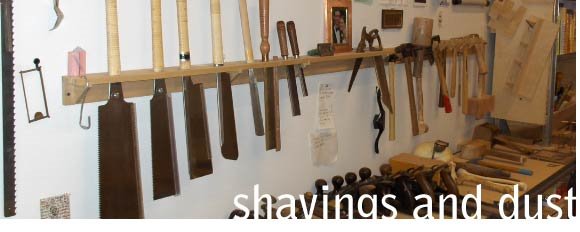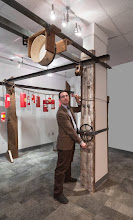I have seen
The old gods go
And the new gods come.
Day by day
And year by year
The idols fall
And the idols rise.
Today
I worship the hammer.
-Carl Sandburg
i have been involved in several conversations lately about value. It has become important recently to examine the things that I value and do what thinking I can around why these things or people or customs or cultural assumptions are valuable, and in fact whether they should be valuable at all.
Central to who I am, and who I have been for most of my life, is my ability to understand that I can shape the world around me physically. This takes a lot of forms, but as a baseline being comfortable with myself as a maker and with my need and desire to make has helped define who I am to myself and to others.
When asked what we do we often respond with a job description. "Teacher," in my case. Or "woodworker." Or for people that I know "computer programmer" or "HR director." This is often what we are paid to do in order to maintain a certain lifestyle, but for how many of us is that what we do, what we love, how we choose to spend our time? I saw a graphic recently that had been made when the unions were campaigning for the eight hour day (yes, that is a gift of the unions, not a magnanimous gift from a benevolent management. People died to bring about the eight hour day. As broken as a some of the union systems are, it is important to remember that they also brought about a lot of good in the lives of the working class) that called for "8 hours of work, 8 hours of sleep. 8 hours of what-we-will." So responding to the question "what do you do?" with a job description is at best only partly right.
What do I do? I make. I do that in my work life, but also in my home life, where my family and I make all kinds of things, from bread to songs to furniture to piles of rocks. We make sticks into light sabers, we make dance parties in the early morning kitchen, we make furniture for our home. My answer to the question at hand is "I make stuff." So does my family. And that is something that I value greatly.
It always surprises me to be reminded what an anathema the idea of making something for yourself is to a lot of people. Smart people that I know and like who have thumbs and good brains have been culturally trained to forget that they can make, that they can influence the world around them in a positive way, that all it takes is the desire to do so and the ability to research methodologies. Mark Frauenfelder wrote a book about that called "Made by Hand" that is a pretty fun read, but the striking thing to me is the subtitle: "Searching for Meaning in a Throwaway World." The implication here is that there is a loss of value (meaning) in the objects around us. For a maker, the assumed reason behind that is that the more separate we become from the origins of the objects and spaces in our lives the less value they have, even if they cost a great deal of money.
I was taught from a very early age by both of my parents that I could and should make things (in large part because they made things). I learned the lesson so well that I live it today, and am passing it on to my children as well. Now that is a valuable.



